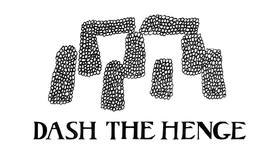
TUATHA
Ghosts
This bizarre collision of acoustic ambient, story telling, poetry, and the deep history of Ireland plays out as a fevered vision filtered through The War of the Worlds, impending environmental collapse, the pandemic, and a lively interest in fairy magic. ‘Who knew in 2019 we were being watched from afar by an alien race … at the bottom of the garden’? A violin enters, in mourning, guitar drones and staccato bodhrán punctuate a strange dream, ‘the moon, look at that moon, you can just see it, behind the clouds’. Melancholic whimsy evaporates as the dreamer muses abrasively that he is ‘grateful for the pandemic’ and the soundscape lurches into the wailing agony of lamenting Ghosts. Switching character, vocalist Warren intones darkly, ‘there will be a window called react … but you don’t’.
There are more disconcerting flashes that all may not be well, ‘when I closed the door, the birds started up again’. And then he is gone, ‘I died, everyone died’, he reports blankly. But there are greater regrets, ‘I watched The Irishman … well, half of it anyway’. But sly Irish humour won’t save him from the fairy folk, who emerge from the disconcerting mist with a clatter of fluttering bodhrán. Or is this pulsing space-age soundscape from the Ghosts a sinister vision of Martians – are these heat rays sent to pulverise the planet? ‘Maybe I will get resurrected’, ponders our narrator, amid stark warning ‘I own the land, but I don’t own the environment’. It seem this realisation comes too late, as the world burns around us all.
As with Tuatha’s debut EP (released in 2020 on Dog Tunnel), the theatrically inclined vocalist narrator Warren switches character routinely, and another tale is spun, playful fantasies of castles and an obsession with an ‘angel, goddess, genius, insect … a toy-maker’. All blurred with mundane contemporary struggles with ‘the Google maps’, and a nostalgic recollection of the cinema, ‘the place that I last wept’ (later dryly re-phrased as the place he ‘last slept’). Is this dream of valleys and Celtic myth an afterlife? Acoustic strumming and dour bodhrán work plays us out, and this is woven into an electronic collage of bird-song and pastoral soundscape by the Ghosts (a cryptic smile is all that the spirit women offer when Dog Tunnel ask if this is a homage to acoustic ambient pioneers Popul Vuh). ‘I was there in the summer time’, sighs Warren, fading somewhat, ‘well … it was summer in the dream’.
Three of the songs on this album are led not by Warren but by poet James Downes, who examines an Ireland both mired in and fiercely wedded to its complex past. Downes speaks of ‘fingernails of ideology scarring the hills and the harshness of our history staring from the stones’. Plucked violin scampers over a bleak and breathy wind-torn soundscape, climbing through a narcotic haze, and amidst it all, ‘the soul suffering in the suffocating damp’. There are washes of guitar, sparse chattering percussion, and the whisperings and sighing of the Ghosts. ‘We walked to the new schools in bare feet, hoping to forget the past, and they fed us raw history, dripping with our grandfathers blood … what else were we to become’?
There is an awed reverence for Ireland’s elderly, the guardians of deep narrative culture and legend. ‘Tobacco pressed into pipe with leathery hands ... hands with no fear of flame’, whispers Downes, ‘torn and ripped from the land by famine, his people wander, walking down the grass verges … of narrowing roads’. A musical and restless bodhrán whips to the fore, before hissing Ghosts emerge from the shadows, and dervish fiddle work slides into discord. Mournful guitar and plucked strings over hand hammered gong transport us back to the reality of the pandemic and its merciless toll on the old, ‘I saw his last breath bubble, and the wind took off with his soul’.

